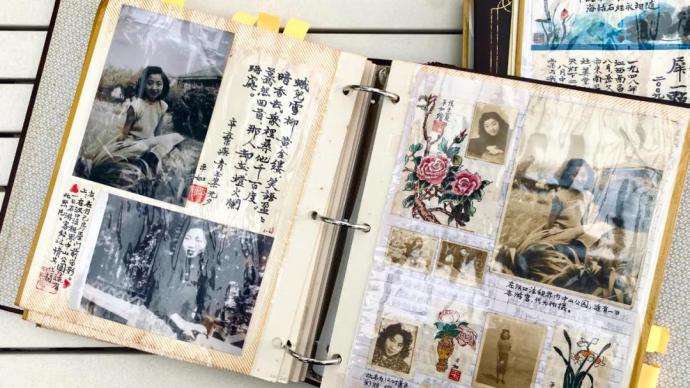
In ancient times, wandering children always planted Hemerocallis flowers in front of the window of their mother's room before they traveled far. Meng Jiao, who wrote "Whoever says that an inch of grass has a heart, will be rewarded with three spring sunshine" also wrote such a verse: "Hemerocallis grows on the stairs, and wanderers travel the world. Kindness leans on the door of the hall, but there are no Hemerocallis flowers." This is Chinese style. Subtle and sad.
On the second Sunday in May, Mother's Day, the daylily flowers bloom, understand mother, and say miss.
"After I Leave"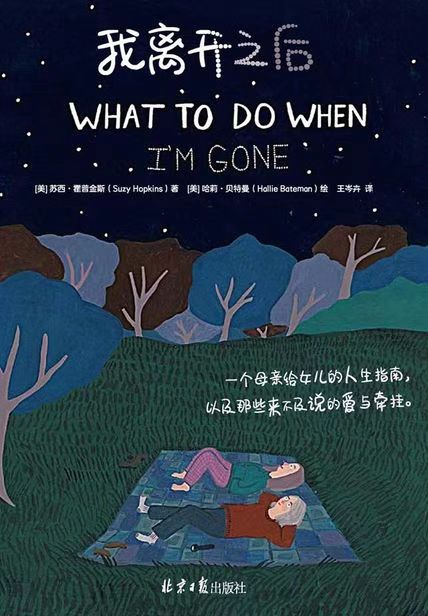
One sleepless night, illustrator daughter Hallie realizes that her mother will one day be one step ahead of her. She fearfully imagined all possible scenarios after her mother left, how many important moments she would miss. The next morning, she asked her mother, Suzy, to write her a "Mom Death Guide", giving her step-by-step instructions on how to get through life without her.
So mother Susie patiently wrote down a note by the number of days to guide her daughter on how to live her life, including the first day of "making tacos," the second day of "allowing people to care about you," and the third day of "giving Grooming the dog"... a mother's guide to healing for her daughter. Although most of the content is said in a lighthearted and humorous tone, many places still reveal the mother's deep concern and attachment to her daughter. For example, on the 2000th day, in the notes of "Have a Good Dream", the mother wrote:
I'm not peeping and I don't want to disturb your life, just drop by to see you. Even if you wake up and forget the words and details of the dream, try to remember this mother-daughter reunion. ...I hope my visit reminds you that Mommy will always love you.
Life is not always easy, and parting is painful. The mother wrote down these little tricks that can make life a little bit better, which is the most precious gift to her daughter.
"Ping Ru Mei Tang" "Life"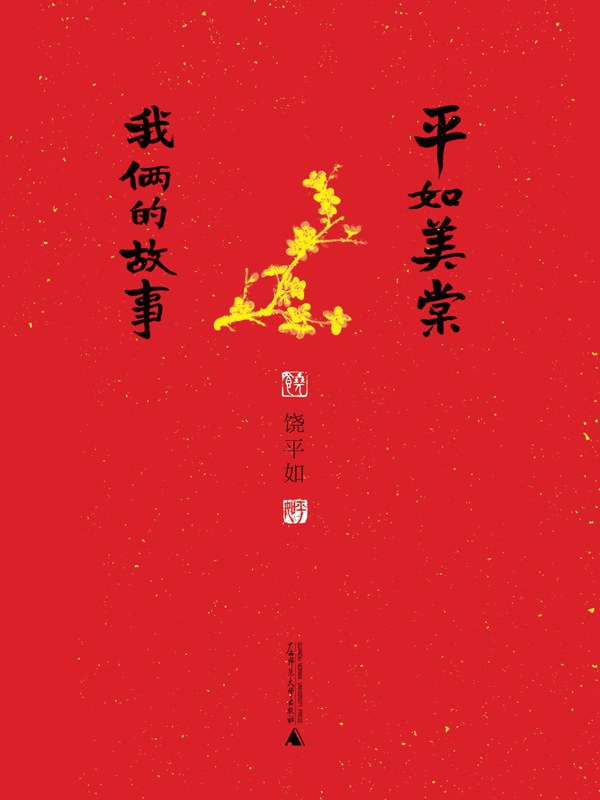
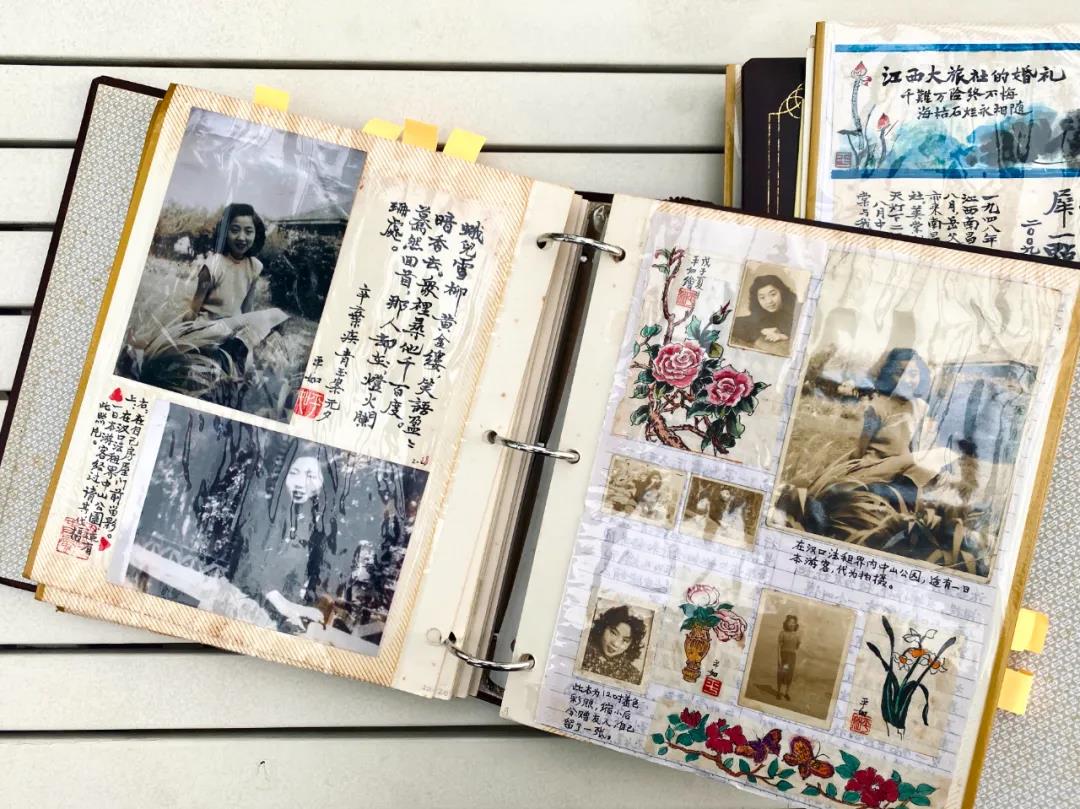
Rao Pingru's third son Rao Le once recalled that in 1958, Rao Pingru was sent to Anhui Forced Labor Camp, and the burden of the family was suddenly placed on Mao Meitang. The girl who once "loved beauty and fun, she and her best friend Liu Baozhen were inseparable, singing and dancing, watching movies, chasing stars, shopping and fashion" carried this impoverished family.
It's just that it is different from the general world that tells about the misery of the 1960s. In "Ping Ru Mei Tang", the dark life of the whole family sleeping on a straw mat and eating salt water for rice is brightened by the mother.
Rao Le once recalled: "The whole family was dressed in shabby clothes. Two beds, a crumbling dining table, and a broken sofa were all the furniture in the house. On the cracked siding, my grandmother drove a lot of nails to hang some of the furniture she needed. Hanging things. It was really quiet at night, we sat around the dining table, or did homework, or read books, draw pictures, etc. On the sofa, grandma would stroke the ink balls (grandmother's cat), and mother would roll the newspaper into I can sing softly. My father said that my mother likes to sing "Beautiful Flowers and Full Moon", and I remember more "Farewell", "Yuguang Song", "Singing at Midnight", as well as "Soul Broken Blue Bridge" and "Cui Qing". Spring Dawn on the Embankment, Santa Lucia, Torselli Serenade, Schubert Serenade and other foreign music. I never learned it, but I remember it from my mother. My mother's voice is sweet , but there is always sadness and sadness in the singing. Now that I think about it, it was so difficult at the time, but with my mother, I still feel so warm and happy."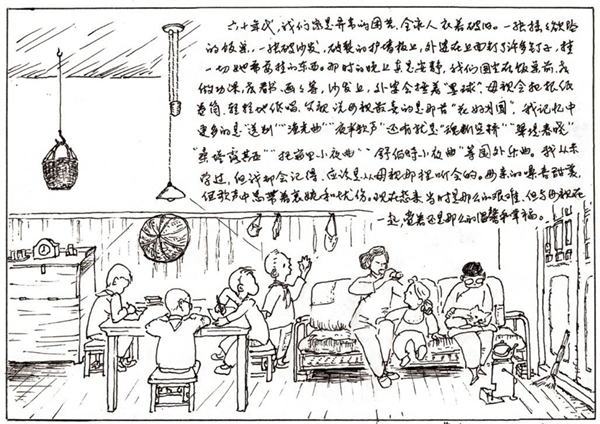
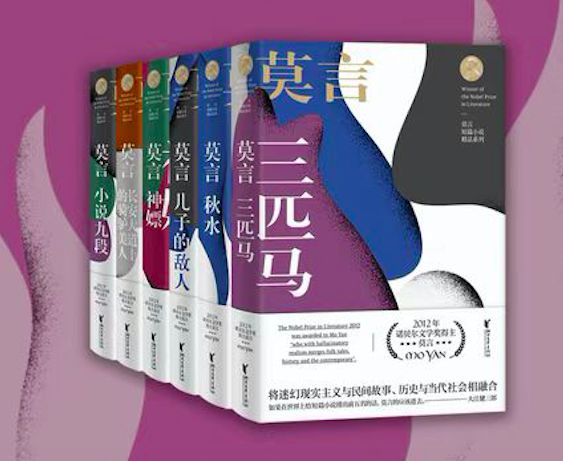
My mother was born in 1922 and died in 1994. Her ashes were buried in Taoyuan, east of the village. In 2011, a railway was going to pass there, and we had to relocate her grave further from the village. After digging the tomb, we saw that the coffin had decayed, and the mother's bones had been mixed with the soil. We had to dig up some dirt, symbolically, and move it into the new grave. That is to say, from that moment on, I felt that my mother was a part of the earth, and my speech on the earth was my speech to my mother.
In the following speech, Mo Yan told seven or eight stories of his mother, the story of the thermos bottle, the story of eating dumplings, selling cabbage, and gleaning wheat, being strong for a long time and unwilling to give up his life, and supporting his son from a poor family. Learning the knowledge of reading, piece by piece, shows the tenacity, love and insight of a rural mother. As Mo Yan said, open the mother, open the floodgates of memory, and then get inspiration. Mother is really the most important motif in Mo Yan's writing. Different from the heavy "Red Sorghum" earlier and "Large Breasts and Buttocks" written like a long song because of his mother's death, mother is in Mo Yan's short stories. It does not have to be metaphorical to land and civilization, does not have to bear heavy history, and is sometimes just a vivid mother full of life wisdom.
For example, in the short story "Cat Things Gathering", when the "Siqing" work team came to the village, how my grandmother and mother took great pains to prepare a good table for Comrade Chen, using the nested structure of "story within story" Retelling the many stories about cats told by my grandmother is really lively and interesting.
"Autumn Garden"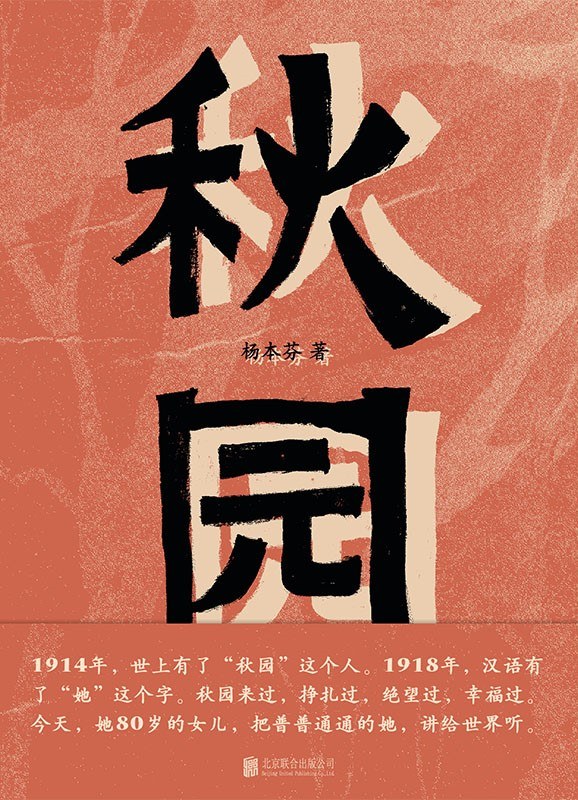
Taste the ups and downs
it ended up like this
She used these two sentences to describe her life. "
In 2020, 80-year-old Yang Benfen published the first book "Autumn Garden" in her life. In this small brick-red book the size of a palm, she recorded the life of her mother Liang Qiufang. Yang Benfen named her mother "Qiu Yuan", and she incarnated as the eldest daughter "Yang Zhihua" in the text. Qiu Yuan's life of misery piled up against her daughter. pen tip and eye socket. The author said: "I wrote the story of an ordinary Chinese woman's life, how our family struggled to survive like driftwood in the water, and the life and death of those rural people in the hinterland of central and southern China. I know the story I wrote. Like a drop of water, it will eventually flow into the long river of human history."
Of course, the unique charm of "Autumn Garden" lies in the fact that it has written the ups and downs of a mother's life with the brushstrokes of documentary and memory, and the people who have been exiled to the bottom of society seem so insignificant and powerless in the face of fate, as if they will be crushed at any time. But so flexible. But what is more precious is that "Autumn Garden" is a biography written by ordinary people, it is the memoir written by the most insignificant person in a four-square-meter kitchen with a low stool as a table, and the success of "Autumn Garden", It also proves that every mother who has tried her best to survive is worthy of being read and seen.
"Mulan's Marriage"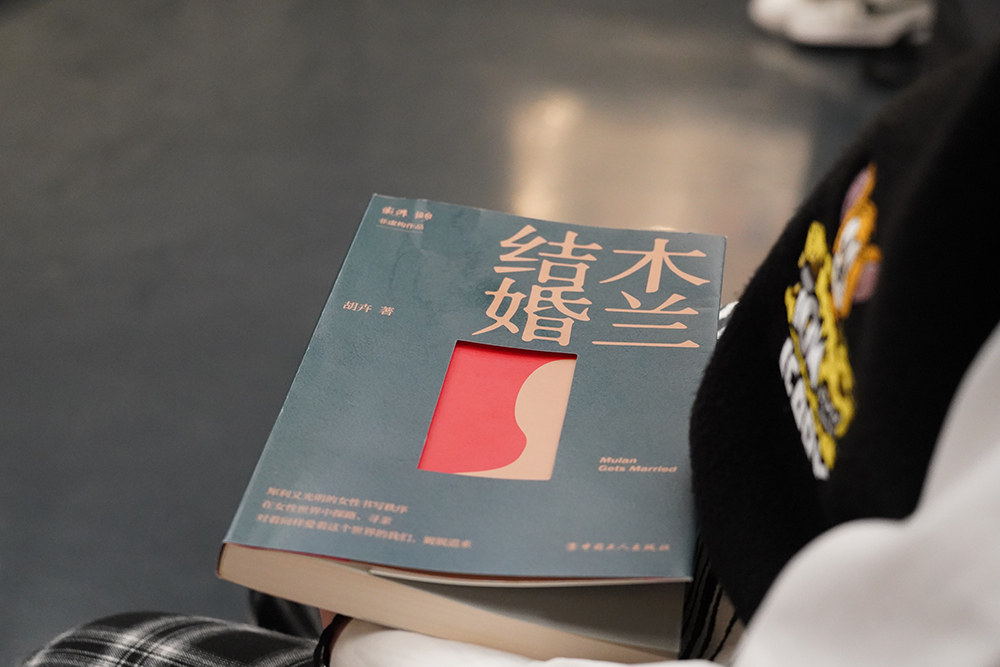 Many classic works describe the extremely complicated mother-daughter relationship, and the same is true for "Mulan Gets Married".
Many classic works describe the extremely complicated mother-daughter relationship, and the same is true for "Mulan Gets Married".
The book "Mulan Gets Married" contains the true stories of 15 women. They are either young or old, married or single, in predicament, or have come a long way. They face various complex and subtle environments and challenges when dealing with themselves and the world.
The author Hu Hui said that "Mulan's Marriage" is the title of one of the fifteen stories. "Mulan" is not the ancient Hua Mulan, but a girl named Pang Mulan. The story tells how she faced marriage. Choice, which involves some family memories, including the suicide of the mother and so on. Rather than blindly pretending to be the role of mother, "Mulan's Marriage" focuses on another possibility - when a mother is not the kind of qualified mother in the public evaluation system, how should children deal with themselves and how should they behave? Build up your own tenacious spiritual world, and rely on yourself to transcend the plight of reality when there is no model to model.
Writer Zhang Yiwei said that in this era, the relationship between mother and daughter is becoming more and more diverse. Some mothers and daughters are hardly like people from the same world except for their blood relationship. Aside from the superficial problem, the serious intergenerational conflict may be asking whether the daughter wants to be like a mother. "This is actually the question that Chinese people don't like to discuss the most, and it is a very subtle part of a family relationship. , it's about real perception, it's about truth."
"The Choice to Be a Mother"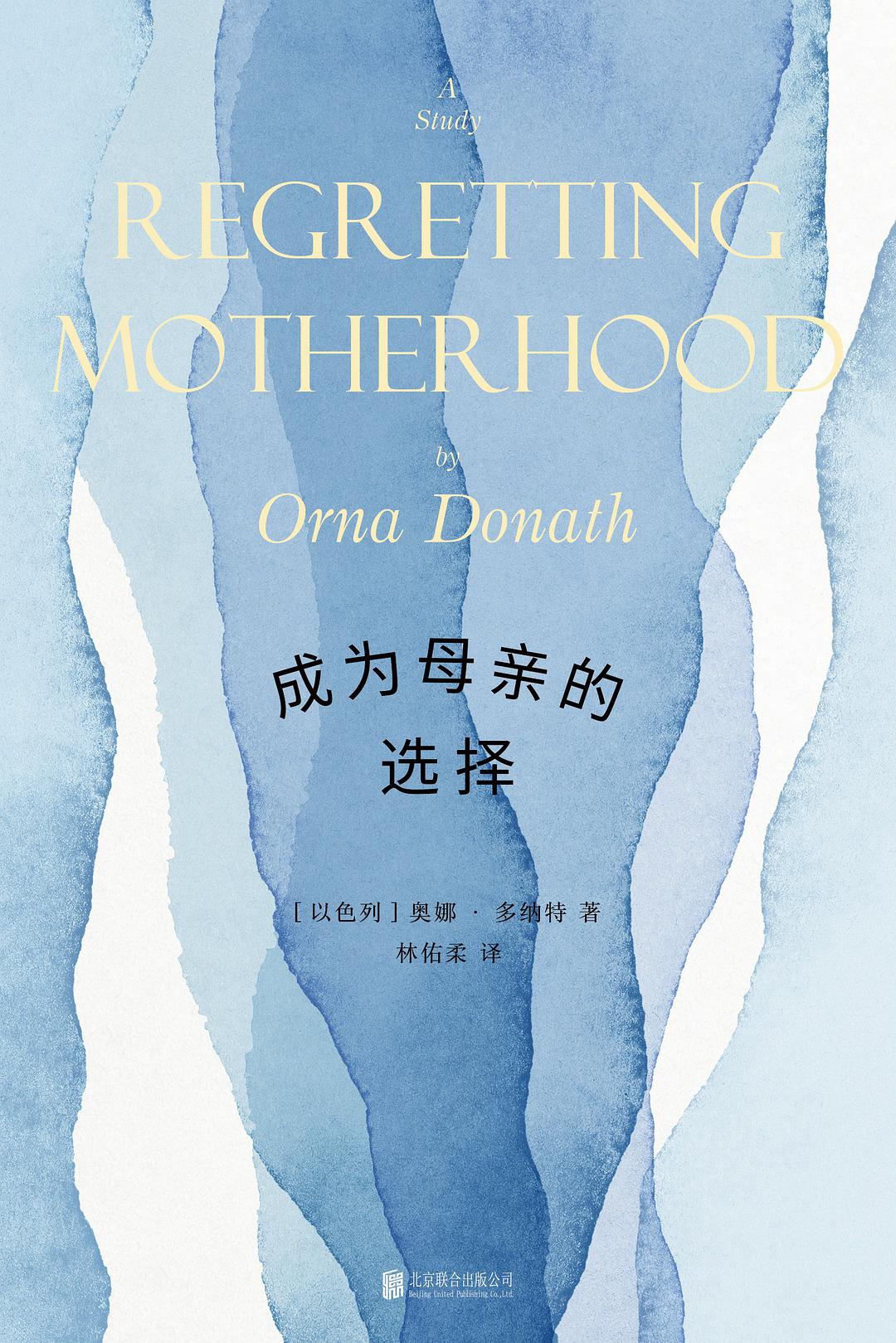
For this book, Donat interviews twenty-three Israeli women who, regardless of age, education, or social class, have one thing in common: motherhood. Through long-term follow-up interviews, Donat traced the process of these women becoming mothers, analyzed their emotional world before and after the birth of their children, and investigated how they recognize and resolve the contradictions and conflicts in the process of childbirth.
For women, motherhood can be a fundamental and important role, linking motherhood with fulfillment, joy, love, comfort, pride, and satisfaction; we also know that mothers’ tensions and ambivalence can create Helplessness, helplessness, guilt, shame, anger, hostility, and disappointment. We are also beginning to be willing to understand that mothers are also human, and may consciously or unconsciously have thoughts of hurting others, however, we still desire that these flesh-and-blood female experiences do not shatter the mythical image of mothers, so we do not recognize mothers may also regret it.
"In this book, I trace their journeys to motherhood, analyze their intellectual and emotional worlds after the birth of their children, and outline how their feelings conflict with the pain in life that comes from 'their wish they could be free from their mothers' identity, but in fact have become mother's gap. In addition, I also investigate how these different women perceive these conflicts and how to deal with them," the author said.
Author Orna Donas also argues that not all mothers like children from the start, and they may not have the will to have children, but do so because of social pressure. But for most people, motherhood is inherent and sacred, and the idea that "mothers may not love children" is simply a blasphemy to the image of motherhood, and people prefer to believe that this is just because of social or economic pressure, as long as it can provide Corresponding assistance can solve all problems, so social choice turns a blind eye to "mothers who are born with no feelings for their children." However, motherhood is not necessarily natural. If the superstition of motherhood is not broken, it will create generations of mothers who regret it.
"my mom"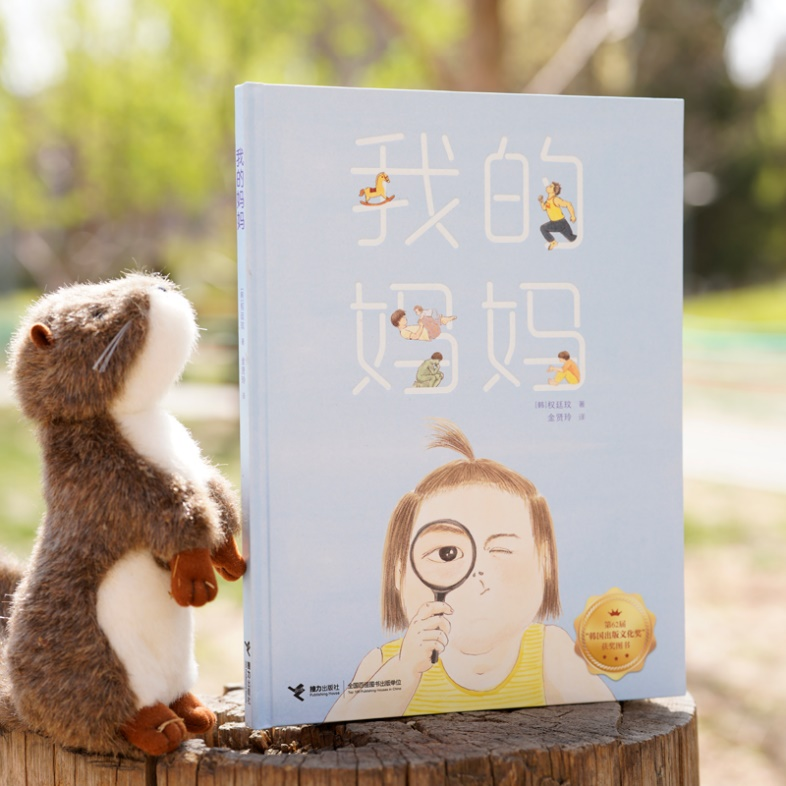
The recent one, "My Mom", which won the "Korea Publishing Culture Award", is another style. This picture book transfers the authority of the narrative to the child, studies and records the mother from the child's perspective, and focuses on the mother's care. The real state of the baby - because of the birth, so the body is out of shape; because of the night feeding, so sleepy during the day; because of not taking care of the baby all the time, so my life becomes embarrassing...
The glorious identity of a mother always hides a lot of truth. Every mother is encouraged to be beautiful, strong, and almost perfect, but as many mothers say: "It's the first time for a mother, and everything is very strange and difficult." Only Only by clearly seeing the hardships and fatigue in raising a child, and seeing the countless small problems in life that need to be overcome, can we better understand what a mother is.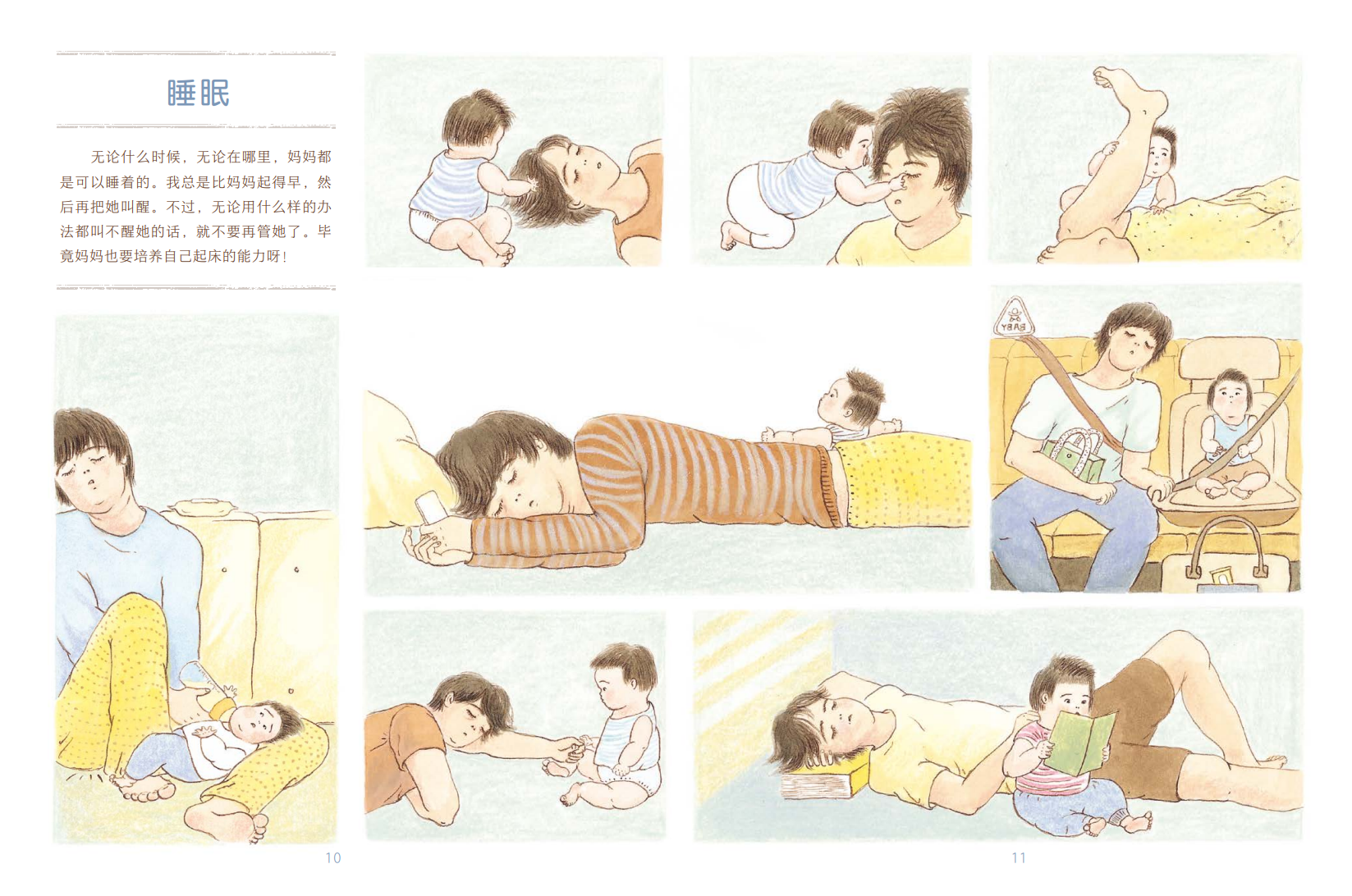 "How Difficult Is It: A Middle-Aged Mother's Self-Redemption"
"How Difficult Is It: A Middle-Aged Mother's Self-Redemption" 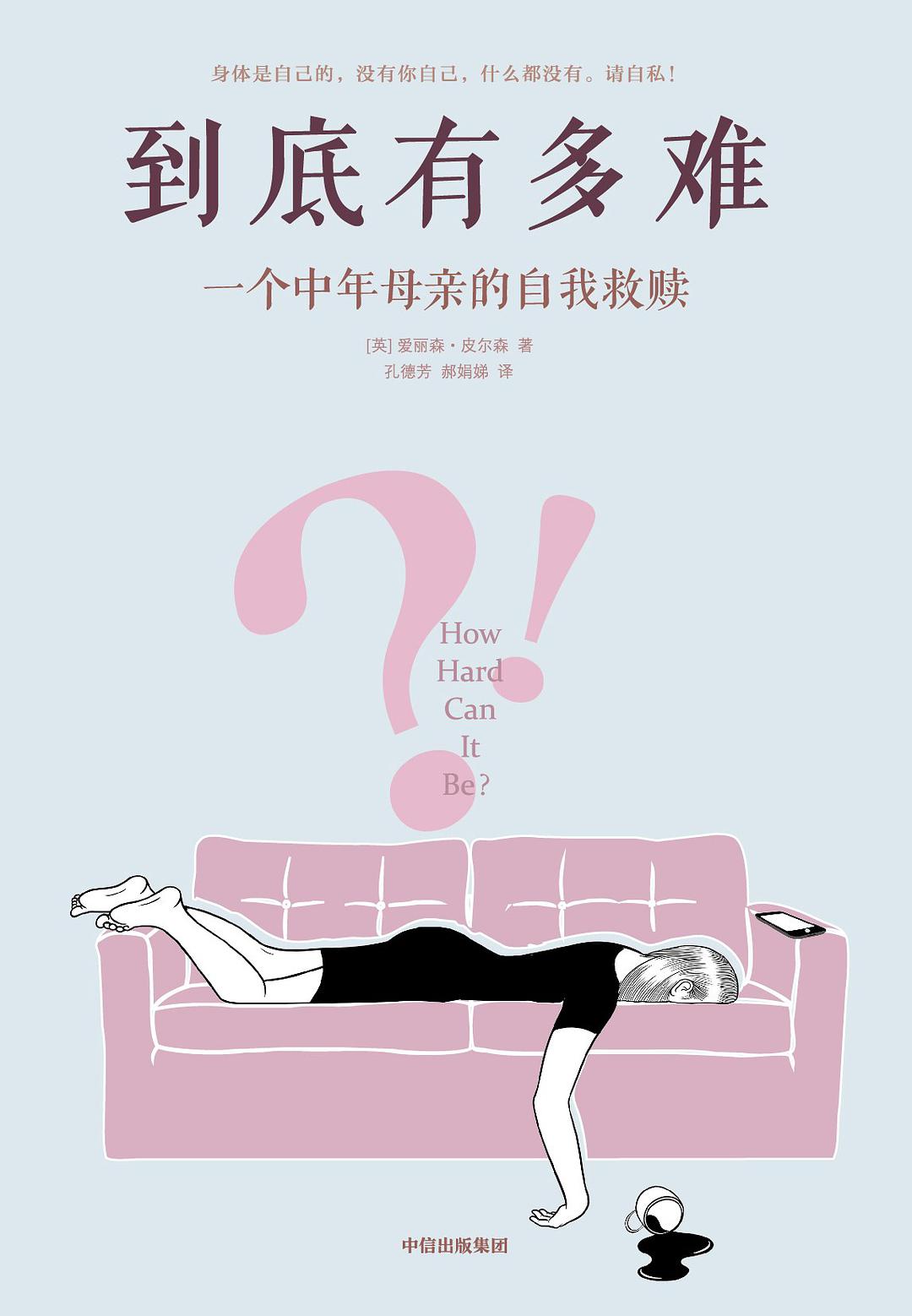
Each chapter in the book is limited by time, and writes more specific things that happened at different time points, like a neighbor who lives next door telling you about the trivial daily life, from the subtitles of some chapters in the book. Look, "fat that can't be lost", "find a thinner, more energetic and more savvy self", "maintain a state of elation in the earthquake of family life"... In the author's pretending to be relaxed or complaining ramble, It is full of the desolation and exhaustion of middle-aged people.
"How Difficult Is It" unabashedly exposes the cruel side of life. Women have a set of "perfect life" based on the logic of patriarchy—the husband loves himself and can earn money to support the family, the children are obedient, and the life is safe. The awakening of many women and the origins of many women's stories are as mentioned above. The serenity of the world was broken. The protagonist Kate also found that she had not paid enough attention to herself in most of her previous life when she had to go to work. It is the choice of many women - when they first entered a family, they hurriedly took on the responsibility of taking care of the family and children, and completely took the initiative or forced to abandon their ideals, careers, and femininity... When they accidentally woke up, they discovered The years are too late.
On the second Sunday in May, Mother's Day, the daylily flowers bloom, understand mother, and say miss.
"After I Leave"

"After I Leave" Book Movie
This is a mother's guide to life for her daughter.One sleepless night, illustrator daughter Hallie realizes that her mother will one day be one step ahead of her. She fearfully imagined all possible scenarios after her mother left, how many important moments she would miss. The next morning, she asked her mother, Suzy, to write her a "Mom Death Guide", giving her step-by-step instructions on how to get through life without her.
So mother Susie patiently wrote down a note by the number of days to guide her daughter on how to live her life, including the first day of "making tacos," the second day of "allowing people to care about you," and the third day of "giving Grooming the dog"... a mother's guide to healing for her daughter. Although most of the content is said in a lighthearted and humorous tone, many places still reveal the mother's deep concern and attachment to her daughter. For example, on the 2000th day, in the notes of "Have a Good Dream", the mother wrote:
I'm not peeping and I don't want to disturb your life, just drop by to see you. Even if you wake up and forget the words and details of the dream, try to remember this mother-daughter reunion. ...I hope my visit reminds you that Mommy will always love you.
Life is not always easy, and parting is painful. The mother wrote down these little tricks that can make life a little bit better, which is the most precious gift to her daughter.
"Ping Ru Mei Tang" "Life"

"Ping Ru Mei Tang" Book Shadow

Rao Pingru organized, drawn and cut out 18 photobooks
"Ping Ru Mei Tang" is an old man Rao Pingru's affectionate remembrance of his deceased wife who had been together for 60 years and finally left first. Readers can see the love between the couple in the slow period, and perhaps more, will see the mother Mao Meitang's difficult management of a huge family with five children in difficult times.Rao Pingru's third son Rao Le once recalled that in 1958, Rao Pingru was sent to Anhui Forced Labor Camp, and the burden of the family was suddenly placed on Mao Meitang. The girl who once "loved beauty and fun, she and her best friend Liu Baozhen were inseparable, singing and dancing, watching movies, chasing stars, shopping and fashion" carried this impoverished family.
It's just that it is different from the general world that tells about the misery of the 1960s. In "Ping Ru Mei Tang", the dark life of the whole family sleeping on a straw mat and eating salt water for rice is brightened by the mother.
Rao Le once recalled: "The whole family was dressed in shabby clothes. Two beds, a crumbling dining table, and a broken sofa were all the furniture in the house. On the cracked siding, my grandmother drove a lot of nails to hang some of the furniture she needed. Hanging things. It was really quiet at night, we sat around the dining table, or did homework, or read books, draw pictures, etc. On the sofa, grandma would stroke the ink balls (grandmother's cat), and mother would roll the newspaper into I can sing softly. My father said that my mother likes to sing "Beautiful Flowers and Full Moon", and I remember more "Farewell", "Yuguang Song", "Singing at Midnight", as well as "Soul Broken Blue Bridge" and "Cui Qing". Spring Dawn on the Embankment, Santa Lucia, Torselli Serenade, Schubert Serenade and other foreign music. I never learned it, but I remember it from my mother. My mother's voice is sweet , but there is always sadness and sadness in the singing. Now that I think about it, it was so difficult at the time, but with my mother, I still feel so warm and happy."

scene sketch
"Mo Yan's Short Story Collection"
"Mo Yan's Short Story Collection"
When Mo Yan won the Nobel Prize for Literature, he delivered a speech titled "The Storyteller", where he introduced his mother to the world at the beginning:My mother was born in 1922 and died in 1994. Her ashes were buried in Taoyuan, east of the village. In 2011, a railway was going to pass there, and we had to relocate her grave further from the village. After digging the tomb, we saw that the coffin had decayed, and the mother's bones had been mixed with the soil. We had to dig up some dirt, symbolically, and move it into the new grave. That is to say, from that moment on, I felt that my mother was a part of the earth, and my speech on the earth was my speech to my mother.
In the following speech, Mo Yan told seven or eight stories of his mother, the story of the thermos bottle, the story of eating dumplings, selling cabbage, and gleaning wheat, being strong for a long time and unwilling to give up his life, and supporting his son from a poor family. Learning the knowledge of reading, piece by piece, shows the tenacity, love and insight of a rural mother. As Mo Yan said, open the mother, open the floodgates of memory, and then get inspiration. Mother is really the most important motif in Mo Yan's writing. Different from the heavy "Red Sorghum" earlier and "Large Breasts and Buttocks" written like a long song because of his mother's death, mother is in Mo Yan's short stories. It does not have to be metaphorical to land and civilization, does not have to bear heavy history, and is sometimes just a vivid mother full of life wisdom.
For example, in the short story "Cat Things Gathering", when the "Siqing" work team came to the village, how my grandmother and mother took great pains to prepare a good table for Comrade Chen, using the nested structure of "story within story" Retelling the many stories about cats told by my grandmother is really lively and interesting.
"Autumn Garden"

"Autumn Garden" book shadow
"When my grandmother died, I went to Hunan to attend the funeral, and accompanied my mother to put the clothes that my grandmother loved during her lifetime into the coffin. In the pocket of one of the clothes, I found a note with some years and years written on it. Location - The most brief biography of my grandmother's notes, the last two lines are:Taste the ups and downs
it ended up like this
She used these two sentences to describe her life. "
In 2020, 80-year-old Yang Benfen published the first book "Autumn Garden" in her life. In this small brick-red book the size of a palm, she recorded the life of her mother Liang Qiufang. Yang Benfen named her mother "Qiu Yuan", and she incarnated as the eldest daughter "Yang Zhihua" in the text. Qiu Yuan's life of misery piled up against her daughter. pen tip and eye socket. The author said: "I wrote the story of an ordinary Chinese woman's life, how our family struggled to survive like driftwood in the water, and the life and death of those rural people in the hinterland of central and southern China. I know the story I wrote. Like a drop of water, it will eventually flow into the long river of human history."
Of course, the unique charm of "Autumn Garden" lies in the fact that it has written the ups and downs of a mother's life with the brushstrokes of documentary and memory, and the people who have been exiled to the bottom of society seem so insignificant and powerless in the face of fate, as if they will be crushed at any time. But so flexible. But what is more precious is that "Autumn Garden" is a biography written by ordinary people, it is the memoir written by the most insignificant person in a four-square-meter kitchen with a low stool as a table, and the success of "Autumn Garden", It also proves that every mother who has tried her best to survive is worthy of being read and seen.
"Mulan's Marriage"
 Many classic works describe the extremely complicated mother-daughter relationship, and the same is true for "Mulan Gets Married".
Many classic works describe the extremely complicated mother-daughter relationship, and the same is true for "Mulan Gets Married".The book "Mulan Gets Married" contains the true stories of 15 women. They are either young or old, married or single, in predicament, or have come a long way. They face various complex and subtle environments and challenges when dealing with themselves and the world.
The author Hu Hui said that "Mulan's Marriage" is the title of one of the fifteen stories. "Mulan" is not the ancient Hua Mulan, but a girl named Pang Mulan. The story tells how she faced marriage. Choice, which involves some family memories, including the suicide of the mother and so on. Rather than blindly pretending to be the role of mother, "Mulan's Marriage" focuses on another possibility - when a mother is not the kind of qualified mother in the public evaluation system, how should children deal with themselves and how should they behave? Build up your own tenacious spiritual world, and rely on yourself to transcend the plight of reality when there is no model to model.
Writer Zhang Yiwei said that in this era, the relationship between mother and daughter is becoming more and more diverse. Some mothers and daughters are hardly like people from the same world except for their blood relationship. Aside from the superficial problem, the serious intergenerational conflict may be asking whether the daughter wants to be like a mother. "This is actually the question that Chinese people don't like to discuss the most, and it is a very subtle part of a family relationship. , it's about real perception, it's about truth."
"The Choice to Be a Mother"

"The Choice of Being a Mother"
"You'll absolutely regret not having children!" That phrase stuck in the back of Israeli sociologist Ona Donat's mind in 2008 when she started a social survey called "Regrets Being a Mom" . Is motherhood innate? Is it a woman's job to be a mother? These questions stayed with Donat and her investigations for the next five years, culminating in the book "Choices of Being a Mother."For this book, Donat interviews twenty-three Israeli women who, regardless of age, education, or social class, have one thing in common: motherhood. Through long-term follow-up interviews, Donat traced the process of these women becoming mothers, analyzed their emotional world before and after the birth of their children, and investigated how they recognize and resolve the contradictions and conflicts in the process of childbirth.
For women, motherhood can be a fundamental and important role, linking motherhood with fulfillment, joy, love, comfort, pride, and satisfaction; we also know that mothers’ tensions and ambivalence can create Helplessness, helplessness, guilt, shame, anger, hostility, and disappointment. We are also beginning to be willing to understand that mothers are also human, and may consciously or unconsciously have thoughts of hurting others, however, we still desire that these flesh-and-blood female experiences do not shatter the mythical image of mothers, so we do not recognize mothers may also regret it.
"In this book, I trace their journeys to motherhood, analyze their intellectual and emotional worlds after the birth of their children, and outline how their feelings conflict with the pain in life that comes from 'their wish they could be free from their mothers' identity, but in fact have become mother's gap. In addition, I also investigate how these different women perceive these conflicts and how to deal with them," the author said.
Author Orna Donas also argues that not all mothers like children from the start, and they may not have the will to have children, but do so because of social pressure. But for most people, motherhood is inherent and sacred, and the idea that "mothers may not love children" is simply a blasphemy to the image of motherhood, and people prefer to believe that this is just because of social or economic pressure, as long as it can provide Corresponding assistance can solve all problems, so social choice turns a blind eye to "mothers who are born with no feelings for their children." However, motherhood is not necessarily natural. If the superstition of motherhood is not broken, it will create generations of mothers who regret it.
"my mom"

"My Mom" Book Movie
Beginning with "Kim Ji-young Born in 1982", the women shown in Korean female-themed works have been suppressed to the extreme, and the sadness of the last battle has caused continuous echoes.The recent one, "My Mom", which won the "Korea Publishing Culture Award", is another style. This picture book transfers the authority of the narrative to the child, studies and records the mother from the child's perspective, and focuses on the mother's care. The real state of the baby - because of the birth, so the body is out of shape; because of the night feeding, so sleepy during the day; because of not taking care of the baby all the time, so my life becomes embarrassing...
The glorious identity of a mother always hides a lot of truth. Every mother is encouraged to be beautiful, strong, and almost perfect, but as many mothers say: "It's the first time for a mother, and everything is very strange and difficult." Only Only by clearly seeing the hardships and fatigue in raising a child, and seeing the countless small problems in life that need to be overcome, can we better understand what a mother is.
 "How Difficult Is It: A Middle-Aged Mother's Self-Redemption"
"How Difficult Is It: A Middle-Aged Mother's Self-Redemption" 
How Difficult Is It: A Middle-Aged Mother's Self-Redemption?
Continuing the discussion of "what is a mother", the whole story of "How Difficult Is It: The Self-Redemption of a Middle-aged Mother" is as follows: the protagonist Kate used to be a capable fund manager. The young child grew up well, and she chose to quit her job to go home and become a stay-at-home mother. But a few years later, her husband was laid off and laid off at home, and she even needed to spend a lot of money to receive psychotherapy. The family had a heavy mortgage pressure, and her children had to spend money, which forced her to return to the society to seek work.Each chapter in the book is limited by time, and writes more specific things that happened at different time points, like a neighbor who lives next door telling you about the trivial daily life, from the subtitles of some chapters in the book. Look, "fat that can't be lost", "find a thinner, more energetic and more savvy self", "maintain a state of elation in the earthquake of family life"... In the author's pretending to be relaxed or complaining ramble, It is full of the desolation and exhaustion of middle-aged people.
"How Difficult Is It" unabashedly exposes the cruel side of life. Women have a set of "perfect life" based on the logic of patriarchy—the husband loves himself and can earn money to support the family, the children are obedient, and the life is safe. The awakening of many women and the origins of many women's stories are as mentioned above. The serenity of the world was broken. The protagonist Kate also found that she had not paid enough attention to herself in most of her previous life when she had to go to work. It is the choice of many women - when they first entered a family, they hurriedly took on the responsibility of taking care of the family and children, and completely took the initiative or forced to abandon their ideals, careers, and femininity... When they accidentally woke up, they discovered The years are too late.
Related Posts